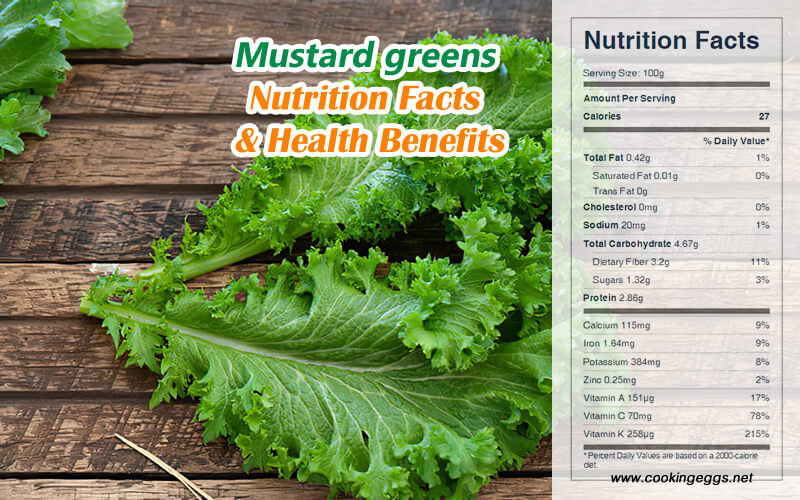Mustard greens Nutrition Facts & Health Benefits
Mustard greens are another leafy member of the Brassica genus. Mustard is an easy-to-grow vegetable for greens or salads. Mustard seeds and leaves are both used as food and medicine.
The nutritional value of mustard greens
The mustard greens are 90% water, 4.6% carbohydrates, 2.8% protein, and 0.4% fat.
In a 100-gram reference serving, mustard greens provide 32 kcal of food energy and are a rich source of vitamins A, C, and K. They are a moderate source of vitamin E and calcium.
One-half cup of chopped, boiled mustard greens provides 11 calories, 1.5 g carbohydrate, 1.6 g protein, 0.2 g fat, 1.4 g dietary fiber, 2122 IU vitamin A, 18 mg vitamin C, 51 mcg folic acid, 141 mg potassium, 11 mg sodium, 29 mg phosphorus, 52 mg calcium, and 11 mg magnesium.

Raw Mustard greens Nutrition Facts Label
Health Benefits of Mustard greens
Mustard greens are very low in calories and fats. They also contain a very good amount of dietary fiber that helps control cholesterol levels by interfering with its absorption in the gut.
Mustard greens are an excellent source of the three antioxidant vitamins, A, C, and E. They are important antioxidants. Vitamin C is a powerful natural antioxidant that offers protection against free radical injury and flu-like viral infections.
As a member of the cruciferous vegetable family, mustard greens also lower the risk of heart and circulatory diseases.
Mustard greens are a very good source of magnesium, which helps with muscle cramps and may help keep the smooth muscles lining the airways relaxed, which can be helpful to people with asthma.
Mustard greens are also an excellent source of calcium. The balance of calcium and magnesium is important to maintaining hydration as well as healthy bones and blood pressure. Mustard greens are known to play a vital role in keeping blood pressure low.
Mustard greens are an excellent source of vitamin K as a multiple of its daily value. Vitamin K is essential for the production of six of the proteins necessary for proper blood coagulation. It plays a role in vascular health. Research suggests that vitamin K can help to support cardiovascular health and reduce the risk of osteoporosis.
Cruciferous vegetables contain glucosinolates, which are under research for their potential to affect cancer.
Note: Common cruciferous vegetables
Horseradish, Kale, Collard greens, Cabbage, Brussels sprouts, Kohlrabi, Broccoli, Broccoflower, Cauliflower, Bok choy, Mizuna, Turnip root/greens, Rutabaga, Watercress, Radish